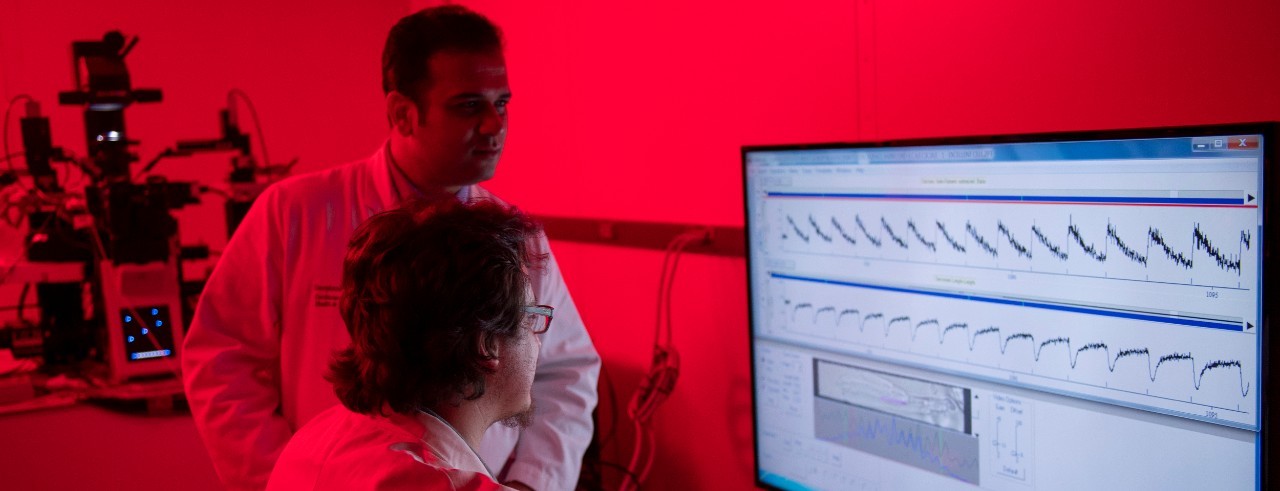
Decoding heart-brain talk
UC researcher receives innovator award to uncover clues to cardiovascular disease
The crosstalk of the heart and brain is continuous and deciphering those messages may help researchers unlock the key to cardiovascular disease, says Deeptankar DeMazumder, MD, PhD, assistant professor in the University of Cincinnati College of Medicine.
“Typically, you’d think the brain tells the heart what to do, but we are finding out that the heart also tells the brain what to do,” says DeMazumder. “The brain can sense the onset of critical illness that typically eludes detection in routine clinical tests until the disease process has overwhelmed the body’s ability to adapt. We are able to eavesdrop on these heart-brain conversations and identify which individuals are at a greater risk for cardiovascular death.”

Deeptankar DeMazumder, MD, PhD, assistant professor in the University of Cincinnati College of Medicine. Photo by Colleen Kelley/UC Creative + Brand
DeMazumder, also a clinical cardiac electrophysiologist at UC Health, has developed a set of artificial intelligence algorithms to decipher waveform bio signals from the heart and the brain. Those messages like many heart/brain signals are routinely captured in bedside telemetry monitoring. However, researchers are just beginning to make sense of these newly recognized signals, which while present throughout the day are often more detectable during sleep.
“There is a lot of noise because the brain is speaking to many parts of the body,” DeMazumder says. “When we go to sleep that quiets down because the brain isn’t telling the arms and legs when to move and it is focusing on vital communications. We can focus on this communication and decode it. In this communication is a hidden signature that tells us who has homeostatic imbalance in their body or early onset of potentially fatal disease. The brain can sense this and if we can tap into this then we can identify who is going to have really bad clinical outcomes.”

Deeptankar DeMazumder, MD, PhD, shown (center) in his College of Medicine laboratory with graduate and medical students. Photo by Colleen Kelley/UC Creative + Brand.
DeMazumder’s research in this area is promising. It has captured the attention of the National Institutes of Health (NIH). He has received an NIH Director’s New Innovator Award of $2.4 million to further his work for the project titled “Eavesdropping on heart-brain conversations during sleep for early detection and prevention of fatal cardiovascular disease.”
The award, established in 2007, supports innovative research from early career investigators who are within 10 years of their final degree or clinical residency and have not yet received an equivalent NIH grant. DeMazumder is among 53 new innovator grant awardees in 2020.
“It is among the most competitive and highly coveted awards from the NIH and culminates after a series of intensive reviews undertaken by a carefully selected group of the most accomplished scientists in the country,” says Richard Becker, MD, director of the UC Heart, Lung and Vascular Institute and a professor in the College of Medicine. “In receiving the NIH Director's New Innovator Award, Dr. DeMazumder joins a list of prior awardees who have changed paradigms and opened new doors in science and medicine through brilliance, creativity and a passion to unravel their mysteries.”
Our ability to decode [heart-brain] messages and reveal hidden critical illness has potential to save many lives.
Deeptankar DeMazumder, MD, PhD assistant professor, UC College of Medicine
DeMazumder’s research has also been supported by the National Institutes of Health, separately from the above award, the U.S. Department of Defense and the American Heart Association.
“The heart is more than just a simple pump,” says DeMazumder. “It is a highly complex sensory organ for receiving and processing important information from other organ systems, and influencing the higher brain centers involved in perception, cognition, emotion, and adaptive response to illness. We are just beginning to understand the central role played by heart-brain conversations. Our ability to decode these messages and reveal hidden critical illness has potential to save many lives.”
Featured image of Deeptankar DeMazumder, MD, PhD, and UC graduate student Jeffrey Crocker in a College of Medicine laboratory. Photo by Colleen Kelley/UC Creative + Brand.
Impact Lives Here
The University of Cincinnati is leading public urban universities into a new era of innovation and impact. Our faculty, staff and students are saving lives, changing outcomes and bending the future in our city's direction. Next Lives Here.
Stay up on all UC's COVID-19 stories, read more #UCtheGood content, or take a UC virtual visit and begin picturing yourself at an institution that inspires incredible stories.
Related Stories
Ohio could soon make breast cancer screenings more affordable
May 9, 2025
The University of Cincinnati Cancer Center's Ann Brown was featured in Local 12 and Cincinnati Enquirer reports on a bill introduced by Rep. Jean Schmidt in the Ohio legislature that seeks to eliminate out of pocket medical expenses such as copays and deductibles associated with supplemental breast cancer screenings.
Preparing students for artificial intelligence in education
May 8, 2025
Laurah Turner, PhD, associate dean for artificial intelligence and educational informatics at the University of Cincinnati's College of Medicine, recently joined the For The Love of EdTech podcast to discuss the usage of personalized learning and AI coaches to enhance educational experiences.
UC lab-on-a-chip devices take public health into home
May 8, 2025
University of Cincinnati engineers created a new device to help doctors diagnose depression and anxiety. The “lab-on-a-chip” device measures the stress hormone cortisol from a patient’s saliva. Knowing if a patient has elevated stress hormones can provide useful diagnostic information even if patients do not report feelings of anxiety, stress or depression in a standard mental health questionnaire.
